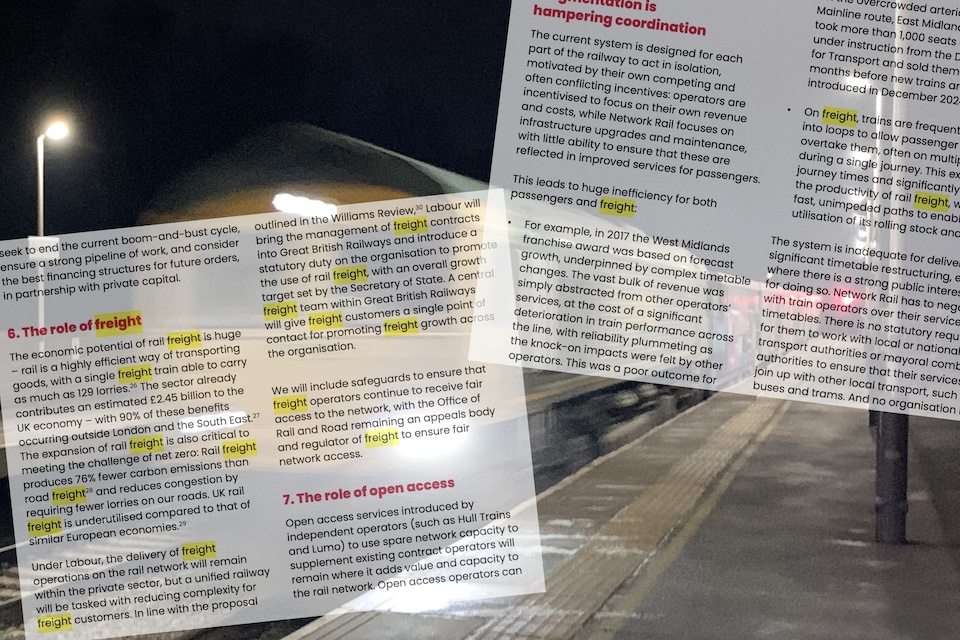The left-wing Labour Party is expected to take over in office when the United Kingdom goes to the polls later this year. The party has been in opposition for thirteen years. It could be argued that the traditionally blue-collar and industrial Labour Party has had plenty of time to formulate its plans for office. So, when the party’s Plan for Rail was revealed last week, it was received with much anticipation.
Louise Haigh has her political sights set on the cabinet office at the Department for Transport. With her party’s elevation to government, as widely predicted as bank holiday engineering works and a replacement bus service, she can just about pull the trigger anytime she likes. Of course, she’ll need some ammunition. That’s why last week’s Plan for Rail was fired off to an expectant audience.
Plan recognises the huge potential of rail freight
It takes a special kind of politician to grasp the nettle of a cabinet secretary for transport. Haigh must surely hope to do better with “Getting Britain Moving: Labour’s Plan to Fix Britain’s Railways”. The transport portfolio has, more often than not, been the double-edged sword of British politics. From Maples to Grayling and from Barbara Castle to Alastair Darling, the mandarin of Horseferry Road has hardly been defined by their time at the Department for Transport. Well, all except Ernest Marples, whose name will always live on for closing half of the railway network at the same time as his wife’s company built a web of motorways.
Hardly a legacy that endears his memory to the rail industry. “We welcome Labour’s plans to seize the huge economic potential of rail freight, which already contributes £2.45 billion to the UK economy”, said an enthusiastic response from John Smith, Chief Executive Officer of GB Railfreight. “Rail freight helps to deliver millions of items to consumers across the UK each year, from pinot grigio to paracetamol, all the while helping to reduce road congestion and carbon emissions.”
While the Plan has an obvious emphasis on passenger services (this is a de facto manifesto, after all) the rail freight industry does have much to consider. The status quo is broadly promised by the Plan, but even that is of note for the operators. Freightliner, for example, welcomes the vision, which they say will help to meet their own environmental commitments and economic productivity. They say it will particularly help deliver regional growth. “Labour’s plan recognises the huge potential of rail freight and the importance of securing modal shift to help achieve our net zero targets and support economic growth.”, said Tim Shoveller, CEO of Freightliner.
“We welcome the plans announced by Labour as a positive vision for rail freight. Labour’s plan recognises the huge potential of rail freight and the importance of securing modal shift to help achieve our net zero targets and support economic growth. Growing rail freight volumes will require supportive policies that make rail the mode of choice for customers and we will continue to work closely with the current Government and with future Governments to ensure that we harness rail freight’s full potential.”
Rail reform early in the next parliament
The industry’s representative associations have also been kind to the would-be transport secretary. “We are pleased that the Labour Party has highlighted the huge economic potential of rail freight”, said Maggie Simpson, the Director General of the Rail Freight Group. “RFG welcomed the Labour Party’s commitment to rail freight growth. Labour is committed to measures including statutory duties for freight and long-term growth targets. Our members are working to get more goods moving by rail and we strongly welcome this support.”

The Plan and a government of any political persuasion should have rail development as part of its manifesto, says the Railway Industry Association. “It is important that the political parties set out their plans on what they would do if they won the forthcoming General Election”, said Darren Caplan, the RIA Chief Executive. “We welcome the pledge to make rail reform a priority early in the next parliament, which would give certainty to our members about the future structure of the railway industry, and also the commitment to a long-term strategy, which RIA has been calling for in recent years. We now look forward to hearing others’ contributions to the debate.”


